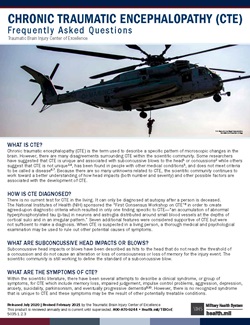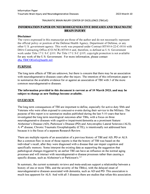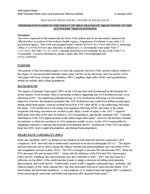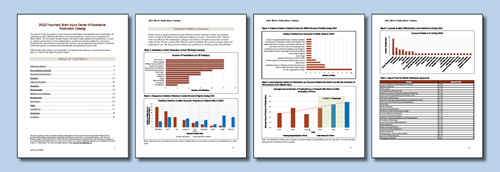TBICoE supports a network of military hospitals and clinics and Department of Veterans Affairs medical centers with traumatic brain injury research initiatives, including gap-driven analyses and congressionally directed programs such as the Section 721 Longitudinal Study of TBI and Section 734 investigation into the effects of blast exposure on Warfighter Brain Health and Performance.
TBICoE's collaborations allow for clinical innovation and research along the continuum of care of TBI—from initial injury to acute and post-acute medical settings; rehabilitation; and ultimately a return to family, community, and work or continued duty.
Beyond conducting research, TBICoE periodically evaluates available peer-reviewed scientific literature to summarize the state-of-the-science, consensus of medical approaches, as well as existing and new evidence of TBI research. These research reviews, information papers, the CUBIST podcast, and the new clinical pearls resources are available for download.
TBICoE Research Gaps and Priorities (2022-2024)
The Research portfolio meets DOD TBI clinical and operational research needs by aligning to TBI knowledge gaps. Every two years, TBICoE’s research section reviews, analyzes, and updates a data-driven, actionable list of research gaps and priorities.
Studies can contribute to multiple gaps depending on the scope of the aims. Primary alignment of a study to a gap occurs when most of the findings address that specific gap, while secondary alignment occurs when a smaller portion of the findings address the gap. The annual "TBICoE Publications Catalog" provides an overview of TBICoE's published work. The 2023 catalog is coming soon, and the 2022 publications catalog is available now.
Review the gaps and priorities.
- Determine the cumulative effects of multiple concussive or sub-concussive exposures or events, on acute and long-term physical, psychological, and cognitive outcomes.
- Determine the prevalence of brain injuries within the military and identify environmental risk factors and variables in various settings (operations, weapons training, combatives, parachute training, etc.).
- Determine the relationship(s) between adverse brain health outcomes resulting from brain injury and/or brain exposures (e.g. blast, blunt, accelerative, and directed energy) and potential co-occurring/influential individual factors, including (but not limited to): health conditions, genetic factors, psychological factors, stress, chronic pain, and substance overuse/dependence.
- Define the chronic/long-term effects which result from brain injury and/or exposure(s) that mayor may not lead to a clinical diagnosis that may influence occupational performance and military readiness in warfighters. This includes the dose/response relationship between exposure(s) and these long-term outcomes and age-related decline or neurodegenerative diseases.
- Determine the mechanisms underlying neuroprotection and cognitive enhancement following brain exposure(s) or brain injury and adapt or refine the use of cognitive performance improvement tools, capabilities, and supplements for the warfighter.
- Evaluate neurocognitive assessment tools and validated metrics that enable an accurate understanding of a warfighter’s cognitive readiness for military activities and readiness requirements.
- Determine the utility and effectiveness of novel TBI treatments, assessments, diagnostic and clinical decision-support tools, and technologies based on objective measures (e.g., biomarkers, sensory system status, neuroimaging changes, and neurocognitive status), all with the aim of supporting care in any environment, including future operations.
- Reliably predict symptom trajectory and variables associated with treatment response for mild TBI patients with common co-occurring conditions (e.g., PTSD, depression, insomnia, etc.).
- Define and mitigate the acute effects of brain injury or exposures that can prevent warfighters from returning to optimal brain health required for military service.
- Evaluate and prioritize novel treatments for TBI, and determine optimal categorization of treatment courses based on symptom subgroups/clusters (e.g., vestibular, headache, PTSD, and psychological health or cognitive).
Research Reviews & Clinical Pearls
The following TBICoE research reviews are fluid areas of investigation and provide an overview on specific topics of interest related to TBI research. These reviews will be updated as new research emerges.
New in 2023, research reviews will be complemented by a supplemental resource, "Clinical Pearls." Both the research review and clinical pearls products are created for both the researcher and the military clinician.
Mild TBI and Posttraumatic Stress Disorder Research Review and Clinical Pearls
This research review is a detailed summary of clinical research on coexisting mild TBI and PTSD.
The research review informs the clinical pearls. It is brief with key action items providers can use when treating service members with both mild TBI and PTSD.
Multiple Concussion Research Review and Clinical Pearls
People with a history of TBI may be at increased risk of:
- Another TBI when exposed to less force.
- Longer recovery from symptoms of that additional TBI.
Contact sports and military service add risk for more than one TBI.
Get key action items and a military clinician’s point of view in the clinical pearls.
Suicide and Traumatic Brain Injury Research Review and Clinical Pearls
This research review is a summary of available clinical research on suicide and TBI. It covers:
- Prevalence
- Risk factors
- Evaluation and screening tools
- Protective factors and treatment
The TBI and suicide clinical pearls provide key actionable items to providers to screen, identify, and treat service members with TBI for suicide risk.
Chronic Traumatic Encephalopathy Research Review and Fact Sheet
Revised in March 2023, the research review addresses the current state-of-the-science of CTE, including an in-depth look at available peer-reviewed scientific literature and a bulleted quick-reference summary for clinicians and the operational community. The revised fact sheet is a quick reference for researchers, the operational community, and clinicians to understand what is known, and not known, about CTE.
In cases with confirmed CTE, there is noteworthy overlap of symptomology and comorbid neuropathological conditions. CTE currently cannot be diagnosed in living persons. The clinical syndrome for living persons, Traumatic Encephalopathy Syndrome, is associated with CTE but is not diagnostic of the condition.

TBICoE Information Papers
Neurodegenerative Diseases and Traumatic Brain Injury
The long-term effects of TBI are unknown, but there is concern that there may be an association with neurodegenerative diseases years after the injury. The intention of this information paper is to summarize the available evidence for or against an association of TBI with 3 of the more common neurodegenerative diseases, Alzheimer’s Disease, Parkinson’s Disease, and Amyotrophic Lateral Sclerosis.
 Download this information paper to learn more about neurodegenerative diseases and TBI.
Download this information paper to learn more about neurodegenerative diseases and TBI.
The Impact of Mild Traumatic Brain Injury on the Autonomic Nervous System
The purpose of this information paper is to provide a general overview of the current evidence related to the impact of concussion, or mild traumatic brain injury, on the autonomic nervous system. This paper will focus on heart rate variability, pupillary light reflex, and hyperhidrosis within the military and civilian populations.
 Download this information paper to learn more about the state-of-the-science of how the autonomic nervous system is impacted by mild TBI. Researchers and clinicians can learn about current tools used to measure ANS and their current clinical utility at this time.
Download this information paper to learn more about the state-of-the-science of how the autonomic nervous system is impacted by mild TBI. Researchers and clinicians can learn about current tools used to measure ANS and their current clinical utility at this time.
Additional Research Resources
TBICoE Congressional Reporting
Some research activity is directed by Congress by National Defense Authorization Acts. That work and the results are reported to Congress. Those reports are part of the public record.
NDAA FY07 Section 721 Report to Congress: Longitudinal Study on Traumatic Brain Injury Incurred by Members of the Armed Forces in OIF/OEF
This study looks at the health effects related to TBI incurred by members of the Armed Forces in OIF/OEF and their families. The final report will be released in 2025.
NDAA FY18 Section 734 Report to Congress: Longitudinal Medical Study on Blast Pressure Exposure of Members of the Armed Forces
The Section 734 Program includes of the following mandates: NDAA FY18 Section 734, NDAA FY19 Section 253, NDAA FY20 Section 717, and NDAA FY20 Section 742.
NDAA FY19 Report to Congress: Chronic Traumatic Encephalopathy
A study and report on chronic traumatic encephalopathy research in the military.
NDAA FY20 Section 750 Report to Congress: Study and Report on Traumatic Brain Injury Mitigation Efforts
This study assessed 30 unique TBI treatments and summarized the findings.
TBICoE Publications
Since 1992, TBICoE has published over 700 peer reviewed manuscripts in collaboration with other institutions, which actively align and respond to trends, gaps, and priorities of the DHA or broader DOD to inform policy, resource management, and state of the science for warfighters, veterans, their families and caregivers, and health care providers.
The purpose of this catalog is to:
- Summarize key findings and potential clinical implications of calendar year 2022 TBICoE publications.
- Increase awareness.
- Assist in planning of future efforts.
This document contains figures that help visually categorize the publications, as well as citations and abstracts of each (abbreviations in abstracts may be modified for consistency throughout this document). Accompanying the abstracts are the potential clinical impact summaries of the work and the associated TBICoE research network site (including research at TBICoE headquarters).
Download the catalog.
